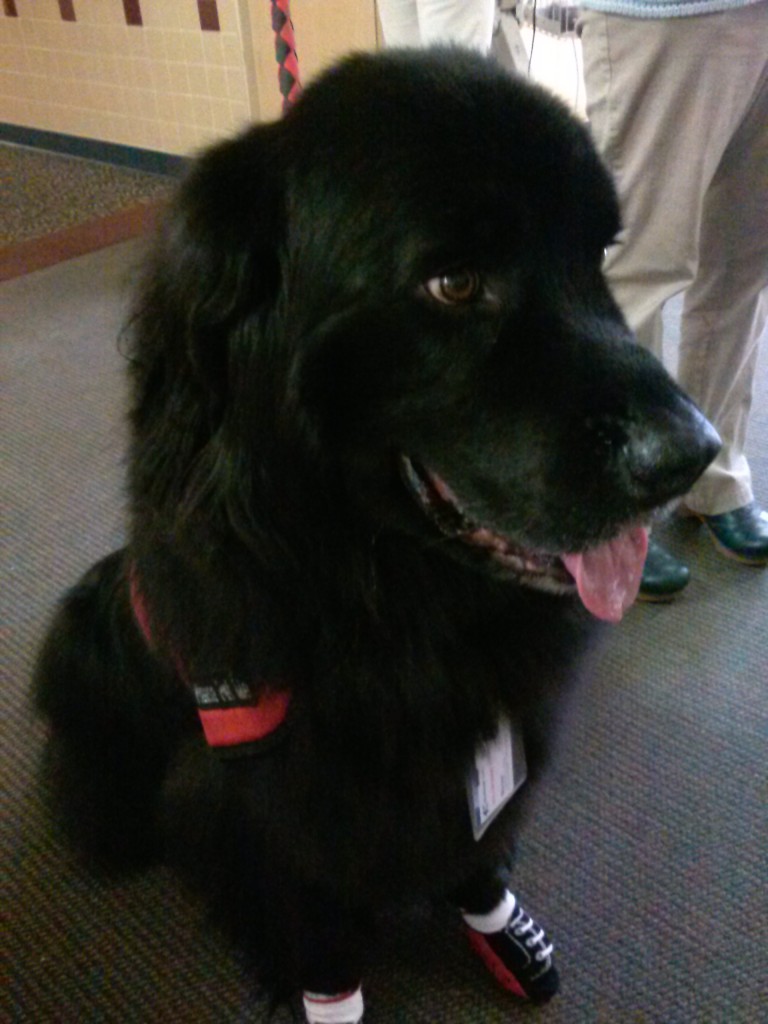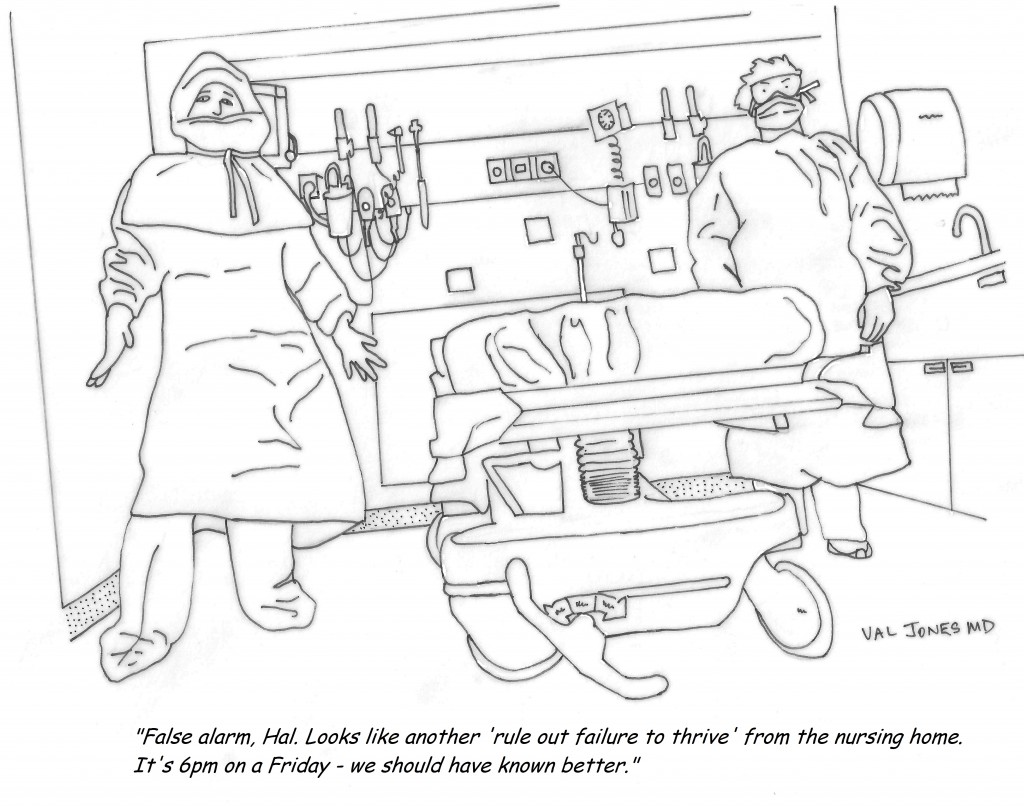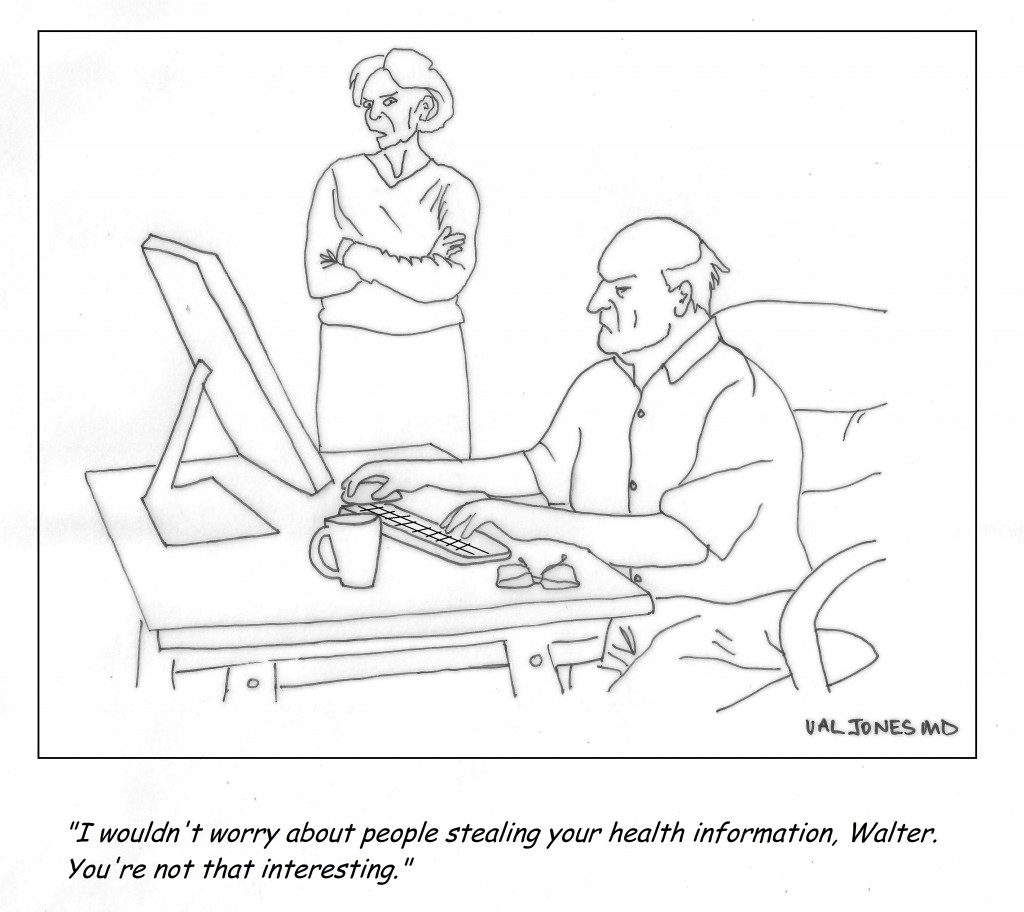March 30th, 2015 by Dr. Val Jones in Opinion, True Stories
2 Comments »
 Popular TV doctor, Gregory House’s favorite adage about patients is: “everybody lies.” I used to believe that this was a cynical and inaccurate statement, but I had to revisit it recently when faced with a patient whose signs and symptoms were consistent with a diagnosis that she vehemently denied.
Popular TV doctor, Gregory House’s favorite adage about patients is: “everybody lies.” I used to believe that this was a cynical and inaccurate statement, but I had to revisit it recently when faced with a patient whose signs and symptoms were consistent with a diagnosis that she vehemently denied.
A young woman was admitted to my rehab unit with brain damage of unclear cause. She adamantly denied drug or alcohol use, and I couldn’t help but wonder if she was suffering from a genetic or autoimmune disorder that the academic neurology team had somehow overlooked. I had recently read the New York Times best-seller, Brain on Fire and feared that I would be like one of those dismissive physicians who missed the author’s unusual diagnosis and nearly killed her from their inaction.
But staring me in the face were the specific physical manifestations of drug and alcohol abuse, though her urine toxicology screen proved she hadn’t used in the very recent past. I asked her again and again if she recalled any exposure to them – probing for an admission of even a small amount of recreational use. She remained adamant. An exhaustive work up had in fact revealed some vitamin deficiencies, the only hard evidence of anything that could explain her very real and devastating impairments. This was not a case of faking symptoms – at least I was sure of that much. Yet her situation continued to haunt me, because until she came clean about the cause of her condition, lingering doubt would drive me to continue the “million dollar work up.”
And for this young and desperately lonely person, the “million dollar work up” may have been her only chance at experiencing ongoing concern for her well being from others. If she admitted to drug use, then the only people who seemed to care about her (sadly, even if it was mostly because she could make a “great case for Grand Rounds”) would probably turn their backs. With the mystery solved, this fascinating neurological conundrum would become a garden variety drug abuser. A person who was, perhaps, not so much a victim as a perpetrator of their own condition.
I don’t believe that those whose conditions are contributed to by their behaviors receive poorer medical care (consider the smoker with lung cancer, or the person with multiple fractures from a bridge-jump suicide attempt – their quality of care will be similar to non-smokers with lung cancer or people with orthopedic needs from a motor vehicle accident). But there may be a subtle and unspoken judgmental attitude held by some of their caregivers and providers.
Fellow friend and blogger, Kerri Morrone Sparling suggests that fear of judgment, and the guilt and shame associated with self-induced harm, are the main reasons why people with diabetes may not come clean to their endocrinologists about their eating and exercise habits. She writes,
Finding enough confidence in myself to admit my shortcomings to my doctor, who I aim to impress with my efforts, was a tall order. For me, it took finding an endocrinologist I trusted with the truth, including the parts of the truth that weren’t so pretty. I know the best doctor for me is one who cares about my emotional response to diabetes, as well as my physical response. It took some trial-and-error, but eventually I found an endo who I felt didn’t judge, but listened and helped me find reasonable solutions to my problems with “reasonable” defined as something I would actually follow through on. Instead of a blanket response of “Do everything. Try harder,” my endo helps me build off of small successes in pursuit of better outcomes.
So patients lie to their doctors because they don’t want to be abandoned, judged, or shamed. And until they are quite certain that this will not happen to them, they are likely to continue withholding information from those who are ostensibly trying to help. The problem of lying does not rest squarely on the shoulders of patients – it is also the responsibility of physicians to make it safe for them to tell the truth. They will commit to honesty when we commit to compassion.
As I look back at my interactions with the young woman with the “mystery” illness, it is not so much the fear of missing the right diagnosis that haunts me now. It is that I did not make her feel safe enough to tell me the truth. In the end, the “million dollar work up” offered her little value for the cost and used up precious healthcare resources.
What she needed was a safe place to live, a supportive environment, a program for drug counseling, and job training for those with disabilities. I missed out on really helping this patient because I was more comfortable with searching for a rare diagnosis than pursuing treatment for the all-too-common, nebulous cycle of social ills that poverty, drugs and abuse cause. Maybe I wanted to believe her lie because at least then there was a chance I could fix her?
As it turns out, I was as invested in her lie as she was – we just had different reasons for it. While she did not want to be abandoned or shamed, I did not want to have to face the fact that I had very little to offer her.
Dr. House was right – under certain circumstances, patients are likely to lie. The other side of the coin, though rarely discussed, is that sometimes doctors are complicit in keeping those lies going.
March 24th, 2015 by Dr. Val Jones in Opinion
No Comments »
 It’s no secret that physicians are experiencing burnout at an exponentially increasing rate in our progressively bureaucratic healthcare system. Many are looking for “alternative careers” as their salvation. I receive emails from physicians all the time, asking for advice about getting out of clinical medicine, since I have spent a few years outside it myself. As my own career pendulum has swung from full time clinical work to full time editorial and/or consulting work, I’ve found that the best mix is somewhere in between.
It’s no secret that physicians are experiencing burnout at an exponentially increasing rate in our progressively bureaucratic healthcare system. Many are looking for “alternative careers” as their salvation. I receive emails from physicians all the time, asking for advice about getting out of clinical medicine, since I have spent a few years outside it myself. As my own career pendulum has swung from full time clinical work to full time editorial and/or consulting work, I’ve found that the best mix is somewhere in between.
If you’re like me, you’re happiest using both halves of your brain. You have a creative side (I’m a cartoonist and blogger) and an analytic side (hospital-based physician). It’s not easy to make a living as a cartoonist or writer, and it’s soul-sucking to work 80 hour weeks in the hospital without rest. So how do you make a living, but participate in all the things you love? You work as a traveling physician (aka locum tenens) one third of your time, and spend the other two-thirds doing the creative things you also enjoy.
“But I couldn’t survive on 1/3 of my salary,” you say. Actually, I make the equivalent of a full-time academic physiatrist salary while working ~14 weeks a year as a traveling physician. Really? Yes, really. Because when I’m filling in at a hospital with an acute need, the work hours are long, and I’m paid by the hour. It can be grueling, but it is short, and the pay is fair so morale remains high. Drawing a flat employee salary (and then often discovering that the work load requires double the time estimated by the employer) can cause a lot of unconscious resentment. But when you are paid for your time, long hours aren’t as dread-worthy. This is what attorneys have been doing from day one, so why not physicians?
“But if all physicians suddenly dropped to half or 1/3 time, wouldn’t that do irreparable damage to patient access?” you cry. Yes, it could be catastrophic. However, if physicians stay the course and do nothing about our burnout, then the powers that be will continue tightening the vice – targeting physician reimbursement, increasing the burden of bureaucratic monitoring, pay for performance measures, and meeting “meaningless abuse” requirements for our electronic medical records systems. If there are no consequences to their actions, why would they ever stop?
I don’t think that most physicians will read this blog post and quit their jobs. I’m not worried about a sudden reduction in the physician work force. What I am offering is a suggestion for those of you who have a secret passion outside of clinical practice – a pathway that allows you to continue practicing medicine, and also enjoy cultivating your other talents. I’m hoping my advice will actually reduce the full drop out rate (if you believe the polls, up to 60% of PCPs would retire today if they had the means) to partial drop out rate (keeping those wanting to quit completely working part time).
So if there’s something you’ve always wanted to do (A non-profit endeavor? A low-paying, but rewarding job? Running a small business that can’t pay all the bills but is fun to do?) I say do it! Life is too short to get caught on the clinical treadmill, driving your spirits into the ground. You love your patients but can’t tolerate the work pace? Don’t quit altogether… you can still be a fantastic, caring, clinician in fewer hours/week and make the salary you need to maintain a reasonable lifestyle.
Please see my previous blog post to gain more insight into whether or not locum tenens might work for you.
And here’s a video of my recent thoughts about locum tenens work:
The Benefits Of Locum Tenens Work
March 17th, 2015 by Dr. Val Jones in Health Tips, Opinion
3 Comments »

Moose, A Therapy Pet In Idaho
As a traveling physician, I’m often asked if I have a favorite place to work. Since I have licenses in 14 states, I have an usual vantage point from which to compare hospitals. I know that people who ask this question presume that my answer will be heavily influenced by the town where the job is located, and all the associated extra-curriculars, environmental peculiarities (ocean, mountains, desert), and potential amenities. The truth is that very little of that is important. Over the years I’ve found that it doesn’t matter so much where you are, as whom you’re with.
As I’ve argued previously, true quality health care is not always predicted by reputation or academic prowess. It has a lot more to do with local hospital culture, and how invested the staff are in giving patients their all. In my experience, some of the very best institutions (in terms of reduced medical error rates, evidence-based practices, and an avoidance of over-testing/treating) are in rural areas. They are not on the America’s Best Hospitals list, but are hidden gems scattered throughout the country. Of course, I’ve also seen some abysmal care in out-of-the way places. My point is that hospital location and reputation is not directly correlated with career satisfaction or excellent patient care.
My favorite hospital is populated by perpetually cheerful staff. Their energy, enthusiasm, and constant supportiveness is remarkable. I once commented that I felt like a therapy pet when I arrived on the unit – everyone was so happy to see me, it was as if I were a golden retriever who had shown up for play time. That feeling can carry me through the most difficult work hours or complicated patient problems. It is so emotionally sunny in that hospital that the surrounding environment could be an Alaskan winter and I’d be ok with it.
Alternatively, there are hospitals where I’m regularly greeted with all the affection that Jerry shows Newman in the Seinfeld sitcom. You know, the eye-rolling, sarcasm-dripping “Helloooo Newman…” Yeah. In those hospitals where I’m made to feel like an unwanted nuisance, time goes by so slowly I can barely stand it. I fight to keep my spirits up for my patients’ sakes, but in the end, the negativity takes its toll. I could be located in the middle of northern California wine country at harvest season and want to get the first flight out. Seriously, your micro-environment is so critical to your happiness. Do not underestimate the importance of liking your peers when you choose your job.
Which leads me to my final point – if you’re thinking about relocating, but aren’t sure if you’ll be happy, why not “try before you buy?” Become a traveling physician (aka locum tenens) for a while to gain some exposure to different places and work environments. Your pre-conceived notions may be off-base. You may fall in love with a place you wouldn’t have thought twice about based on a state map… Because a map won’t tell you where you’ll be welcomed with open arms, versus ostracized by hostile peers. Find out if you’ll be a Newman or a therapy pet at your next hospital. It makes all the difference in the world.
 Popular TV doctor, Gregory House’s favorite adage about patients is: “everybody lies.” I used to believe that this was a cynical and inaccurate statement, but I had to revisit it recently when faced with a patient whose signs and symptoms were consistent with a diagnosis that she vehemently denied.
Popular TV doctor, Gregory House’s favorite adage about patients is: “everybody lies.” I used to believe that this was a cynical and inaccurate statement, but I had to revisit it recently when faced with a patient whose signs and symptoms were consistent with a diagnosis that she vehemently denied.


 It’s no secret that physicians are
It’s no secret that physicians are









